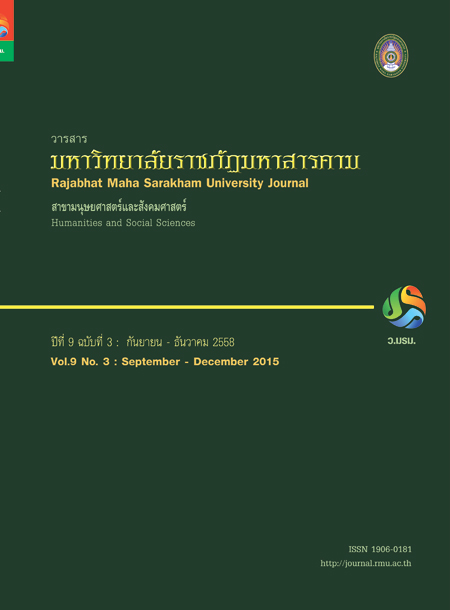การเปรียบเทียบผลการเรียนประเด็นปัญหาสังคมที่เกี่ยวข้องกับการใช้วิทยาศาสตร์โดยใช้การเรียน แบบผสมผสานตามวิธีการทางวิทยาศาสตร์และการคิดทางวิทยาศาสตร์ที่ดี ที่มีต่อความสามารถใน การโต้แย้งและการคิดเชิงเหตุผลของนักเรียนชั้นประถมศึกษาปีที่ 6 ที่มีผลการเรียนวิทยา
Main Article Content
บทคัดย่อ
การวิจัยนี้มีวัตถุประสงค์เพื่อเปรียบเทียบความสามารถในการโต้แย้งและการคิดเชิงเหตุผลหลังเรียนประเด็นปัญหาทางสังคม
ที่เกี่ยวข้องกับการใช้วิทยาศาสตร์ของนักเรียนโดยส่วนรวมและจำแนกตามผลการเรียนวิทยาศาสตร์และรูปแบบการเรียน กลุ่มตัวอย่าง
เป็นนักเรียนชั้นประถมศึกษาปีที่ 6 จำนวน 50 คน แบ่งนักเรียนออกเป็น 2 กลุ่ม ได้แก่ กลุ่มที่ 1 จำนวน 25 คน เรียนโดยใช้การเรียน
แบบผสมผสานตามวิธีการทางวิทยาศาสตร์และกลุ่มที่ 2 จำนวน 25 คน เรียนโดยใช้การคิดทางวิทยาศาสตร์ที่ดี เครื่องมือที่ใช้ใน
การวิจัยประกอบด้วย 1) แผนการจัดการเรียนรู้ประเด็นปัญหาทางสังคมที่เกี่ยวข้องกับการใช้วิทยาศาสตร์ 3 เรื่อง คือ สิ่งมีชีวิตดัดแปลง
พันธุกรรม การตัดต้นไม้เพื่อสร้างถนน และภาวะโลกร้อน 2) แบบทดสอบวัดความสามารถการโต้แย้ง 3) แบบทดสอบการวัดการคิด
This research aimed to study and compare argumentation and logical thinking abilities after learning
socioscientific issues of the students as a whole and as classified according to science learning outcome
and the learning method. 50 Pratomsuksa 6 (grade 6) students from two classes were assigned to an
experimental group of 25 students studying using the mixed methods based on the scientific method and a
control group of 25 students using the mixed methods based on the good science thinking moves. Instruments
for the research included: 1) learning plans on 3 socioscientific issues: Genetically Modified Organisms, Tree
Cutting for Road Construction, and Global Warming 2) an argumentation test and 3) a logical thinking test.
The dependent t-test and the F-test (Two-way MANCOVA and ANCOVA) were employed for testing hypotheses
เชิงเหตุผล การทดสอบสมมติฐานใช้ Paired t-test และ F-test (Two-way MANCOVA และ ANCOVA) ผลการวิจัยพบว่า
Article Details
1. บทความที่ลงตีพิมพ์ทุกเรื่องได้รับการตรวจทางวิชาการโดยผู้ประเมินอิสระ ผู้ทรงคุณวุฒิ (Peer Review) สาขาที่เกี่ยวข้อง อย่างน้อย 3 ท่าน ในรูปแบบ Double blind review
2. ข้อคิดเห็นใด ๆ ของบทความที่ลงตีพิมพ์ในวารสารมหาวิทยาลัยราชภัฏมหาสารคาม นี้เป็นของผู้เขียน คณะผู้จัดทำวารสารไม่จำเป็นต้องเห็นด้วย
3. กองบรรณาธิการวารสารมหาวิทยาลัยราชภัฏมหาสารคาม ไม่สงวนสิทธิ์การคัดลอกแต่ให้อ้างอิงแสดงที่มา


